42 items found for "Afficher tous les contenus"
|
La Journée européenne des langues fête ses 20 ans !
|
Edit
|
Les préparatifs battent leur plein ! |
|
Il est difficile de croire que vingt ans se sont écoulés depuis le lancement de la Journée européenne des langues en 2002 ! En voyant la situation se détendre partout en Europe, nous sommes convaincus que la JEL suscitera l’effervescence cette année encore.
Si vous planifiez un événement, gardez à l’esprit que vous pouvez largement le promouvoir en utilisant le calendrier des événements sur le site web de la JEL et les hashtags #coeEDL, #20EDL ou #happybirthdayEDL sur les réseaux sociaux !
| Edit |
|
Quoi de neuf en 2021 ? |
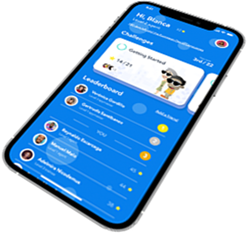 |
|
Défis linguistiques : nouvelle application mobile pour nos agents secrets
Après le succès du manuel des défis linguistiques (actuellement disponible en 29 langues) et la première version d’une application mobile l’année dernière, la nouvelle application « 2.007 » sera bien plus interactive et permettra aux agents secrets en herbe de se mesurer à leurs homologues. Les niveaux proposés permettront de distinguer les inspecteurs Gadget des agents secrets de haut niveau !
Un quiz est actuellement en cours de développement avec la Commission européenne et sera intégré dans l’application. Á partir de début septembre, celle-ci sera téléchargeable sur les téléphones Android et Apple ainsi que sur les ordinateurs Chromebooks.
Un voyage à travers les langues d’Europe
Ce livret téléchargeable vise à éveiller l’intérêt pour la riche mosaïque des langues de l’Europe dès le plus jeune âge. Les enfants peuvent accompagner Lara dans son voyage à la découverte des différentes langues parlées sur le continent. Des fichiers sonores et des séries d’autocollants couvrant les langues respectives seront également disponibles en anglais à partir de juillet ; des traductions et des adaptations suivront dans d’autres langues peu après (https://edl.ecml.at/languagejourney).
| Edit |
|
La JEL fête ses 20 ans ! |
|
Pour célébrer cet anniversaire mémorable, une série de fonctionnalités et d’initiatives seront révélées sur le site web au cours de l’été :
- une infographie sur la JEL avec 20 faits que vous ignorez peut-être au sujet des langues de l’Europe (téléchargeable en juillet) ;
- des questions sur les langues : des experts répondront à 20 questions (par écrit ou dans une vidéo) qu’on pourrait hésiter à poser, telles que « Ai-je vraiment besoin de la grammaire pour apprendre une langue ? », « Est-il vraiment possible de parler plus de 30 langues ? ») (en septembre) ;
- un nouveau sondage sera lancé en juillet pour découvrir quelles méthodes sont les plus populaires et efficaces pour apprendre une langue.
| Edit |
|
Cherchez-vous encore des idées d’activités pour cette journée ? |
- Une initiative pour la Journée :
deux défis vous sont proposés pour célébrer le 20e anniversaire qui peuvent être facilement inclus dans (presque) tout événement (plus d’informations seront disponibles en juillet sur le site web) :
- En combien de langues pouvez-vous dire ou chanter « Joyeux anniversaire » en 20 secondes ?
- Pour vous mettre en appétit… Faites un gâteau pour le 20e anniversaire et/ou inspirez d’autres personnes en envoyant la recette de votre gâteau pour créer un livre de recettes multilingue.
- La pandémie n’étant pas encore terminée, une liste d’idées (20 !) pour organiser des événements respectant la distanciation sociale sera dévoilée en juillet.
| Edit |
|
Concours |
- Un concours pour concevoir le t-shirt de la JEL : le motif gagnant de cette année (un perroquet plurilingue !) pour la Journée européenne des langues a été réalisé par Tímea Svetková de la République slovaque. Le t-shirt est disponbible à la vente en ligne. Pour l’édition 2022 de la Journée, il est possible de soumettre des motifs jusqu’à la date de clôture du concours fixée au 31 décembre 2021.
- L’événement le plus innovant de la Journée européenne des langues a été remporté en 2020 par la Școala Gimnazială nr.1 Unțeni de Roumanie, avec son activité « Une nouvelle langue est une nouvelle vie ». Le concours, assorti d’une petite récompense, sera reconduit du 20 septembre au 20 octobre 2021.
- Un sondage sur les façons les plus efficaces pour apprendre une langue sera lancé sur la page d’accueil du site web de la JEL. Les résultats seront publiés le 24 septembre.
| Edit |
|
Commandez du matériel promotionnel pour vos événements ! |
|
Les organisateurs d’événements qui inscrivent leurs manifestations dans le calendrier de la JEL peuvent pimenter leurs événements en commandant une série d’articles promotionnels auprès des Relais nationaux de la JEL :
- des bracelets JEL en tissu ;
- pour le 20e anniversaire, une édition spéciale « limitée » d’autocollants « Parle-moi » ;
- des feuilles d’autocollants pour le voyage linguistique de la JEL se rapportant au livret, avec des expressions telles que « Bonjour », « Comment vas-tu ? », « Merci » dans plus de 40 langues ;
- des crayons « Écris avec moi » en 7 langues et couleurs.
Nous espérons que les nouveautés proposées répondront à tous les goûts et besoins pour faire de cette journée de septembre un moment très spécial !
| Edit |
|
« Citoyenneté numérique par la formation en langues »
|
Edit
|
Participez au webinaire « Citoyenneté numérique par la formation en langues » le 22 juin 2021 ! |
 |
|
Le projet e-lang citoyen organise ce webinaire bilingue (anglais et français) gratuit le mardi 22 juin 2021, de 17h00 à 18h15 (heure d’été de l’Europe centrale).
- Qu’est-ce qu’un citoyen usager du numérique ?
- Quels sont les points de rencontre entre éducation à la citoyenneté numérique et formation en langues ?
- Quels types de tâches langagières numériques peuvent aider les apprenants à devenir des citoyens usagers du numérique ?
Si vous vous êtes déjà posé l’une de ces questions ou si vous avez déjà tenté d’y répondre, ce webinaire, qui se déroule dans le cadre de l’actuel projet du Centre européen pour les langues vivantes intitulé « Citoyenneté numérique par la formation en langues » (e-lang citoyen), vous intéressera.
Le webinaire s’adresse prioritairement aux enseignants de langues et aux formateurs de formateurs en langues. Il proposera un portrait du citoyen numérique usager des langues et du numérique. Ce portrait s’appuie sur l’analyse d’une centaine de textes publiés récemment, qui comportent une définition du « citoyen numérique » ou qui identifient des composantes de la citoyenneté numérique.
Les points de rencontre entre éducation à la citoyenneté numérique et formation en langues – les compétences d’interaction sociale et de communication, les compétences plurilingues et la médiation – seront explorés lors de l’événement.
Dans le cadre du projet, l’équipe de coordination, issue de cinq pays, prévoit de créer une base de données qui fournira des activités et des tâches d’apprentissage concrètes et pratiques pour développer la citoyenneté numérique dans la classe de langue. Le webinaire offrira un aperçu des premières productions réalisées. Les participants découvriront également comment ils peuvent s’engager davantage dans ce projet.
Vous pouvez vous inscrire ici jusqu’au 21 juin 2021. | Edit |
|
Développements du programme du CELV 2020-2023 – « Inspirer l’innovation dans l’éducation aux langues : contextes changeants, compétences en évolution »
|
Edit
|
Jusque fin 2022 participez à une enquête en ligne en 9 langues sur la place des langues familiales à l’école ! |
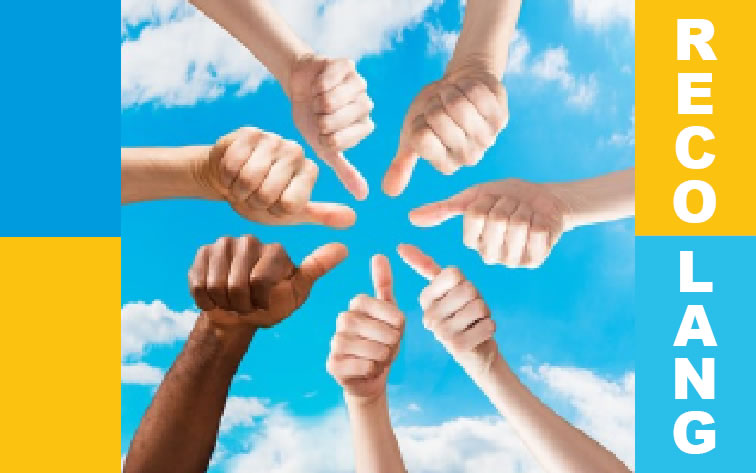 |
|
L’équipe RECOLANG (Ressources pour l’évaluation des compétences en langues familiales des élèves migrants) mène une enquête européenne sur la place des langues familiales à l’école, notamment dans les parcours scolaires des adolescents migrants entre 11 et 18 ans. Cette enquête porte sur les pratiques d’évaluation des compétences en langues familiales et leur rôle dans les différents systèmes éducatifs européens. L’enquête est constituée de deux volets complémentaires à destination de deux publics-cibles :
- Un volet destiné aux élèves âgés de 11 à 18 ans (ou leur famille), ayant une histoire de migration et une ou plusieurs langues familiales d’usage autres que la/les langue(s) de l’école. Ce volet est disponible en allemand, anglais, arabe, français, hongrois, italien, persan (dari/farsi), portugais et turc : https://surveyforlearners.questionpro.com.
- Un volet à destination des institutions scolaires et éducatives équipes enseignantes et d’encadrement des établissements scolaires, d’accueil et de formation initiale et continue des enseignants travaillant avec ce groupe d’âge (11-18 ans). Ce volet est disponible en allemand, anglais, français, hongrois, italien et portugais : https://enqueteinstitutionseducatives.questionpro.com.
L’enquête sera en ligne jusqu’à fin 2022. Des informations plus détaillées sont disponibles sur le site web du CELV. | Edit |
|
« Encourager l’éducation aux langues dans la formation professionnelle transfrontalière » : présentation à la conférence en ligne EARLALL (2 juillet 2021, 9:00h-14:00 CEST) |
|
Edit |
|
« Médiation dans l’enseignement, l’apprentissage et l’évaluation des langues » : 1ère conférence internationale MiLLaT (en ligne, 9 septembre 2021) |
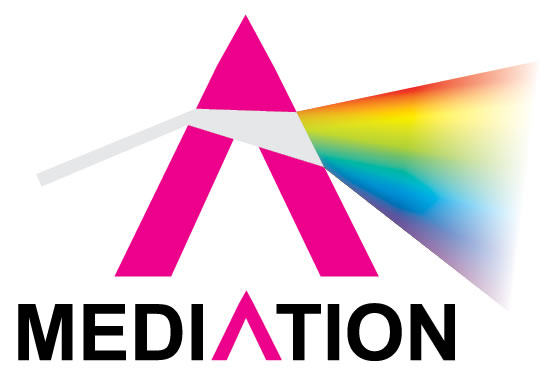 |
|
Le Centre pour l’enseignement des langues étrangères de l’Université de Varsovie organise la première conférence internationale MiLLaT – « La médiation dans l’apprentissage et l’enseignement des langues » (inscription gratuite) sous le patronage honorifique de l’Association polonaise des langues modernes (PTN). L’événement s’adresse aux enseignants de langues, aux formateurs d’enseignants et aux éducateurs qui s’intéressent à la médiation, aux activités et stratégies de médiation, au multilinguisme, aux tâches innovantes dans l’enseignement des langues, aux outils d’enseignement médiatisés par la technologie et aux bonnes pratiques dans l’apprentissage des langues. Son objectif est de créer un forum de discussion et d’élargir les perspectives actuelles sur la médiation, l’apprentissage des langues, l’enseignement et le développement de matériels et d’outils modernes.
Maria Stathopoulou, maître de conférences adjointe à l’Université ouverte hellénique et à l’Université technique nationale d’Athènes, et coordinatrice du projet du CELV « Médiation dans l’enseignement, l’apprentissage et l’évaluation des langues » (ME.T.L.A.) (2020-2021), prononcera un discours lors de l’événement. | Edit |
|
6e Congrès international sarrebruckois de l’enseignement des langues étrangères |
|
Edit |
|
Nouveautés éditoriales du CELV
|
Edit
|
Outils TIC et ressources éducatives ouvertes : découvrez les nouveautés dans l’inventaire du CELV ! |
|
L’inventaire du CELV contient actuellement 193 outils et ressources éducatives ouvertes qui peuvent être utilisés gratuitement dans l’enseignement et l’apprentissage des langues. Ces outils ont été évalués en fonction de critères spécifiques tels que le potentiel pour atteindre les objectifs d’apprentissage, pour l’adapter à votre contexte d’enseignement, pour la communication et la collaboration entre apprenants. La base de données est alimentée en permanence. Voici quelques nouveautés pour vous mettre en appétit :
- Backchannel chat (outil de communication),
- Crossword labs (création de mots croisés),
- CryptPad (éditeur de documents collaboratifs),
- Easyclass (création de cours),
- Flippity (création de matérial interactif),
- ILOBify (application pour améliorer son niveau d’anglais et de français),
- Infogram (création de contenus interactifs),
- iSL Collective (plateforme de partage de matériel didactique)... et il y en a bien d’autres encore à explorer...
| Edit |
|
Publication mentionnant le travail du CELV
|
Edit
|
Formation en langues et littératie numérique en contextes ouverts – Une approche socio-interactionnelle |
|
Référence bibliographique :
Caws Catherine, Hamel Marie-Josée, Janneau Catherine and Ollivier Christian, Formation en langues et littératie numérique en contextes ouverts – Une approche socio-interactionnelle, Éditions des archives contemporaines, 2021, https://doi.org/10.17184/eac.9782813003911.
Ressource du CELV mentionnée :
Ollivier Christian et al., Vers une littératie numérique pour l’enseignement et l’apprentissage des langues, Conseil de l’Europe (Centre européen pour les langues vivantes), Graz, 2018, www.ecml.at/elang.
| Edit |
|
Autriche : nouveau padlet pour les événements de la Journée européenne des langues |
|
Journée européenne des langues 2021 : un nouveau padlet pour promouvoir vos actions autour de la JEL
Souhaitez-vous en savoir plus sur la JEL en Autriche, vous informer sur les initiatives ou commander du matériel promotionnel pour votre propre événement ? Alors découvrez le tout nouveau padlet de la JEL, proposé par le Centre autrichien de compétences en langues (ÖSZ), qui vous permettra de rester informés.
Joignez-vous à l’ÖSZ et faites connaître vos initiatives autour de la JEL en Autriche !
Chaque contribution compte – ensemble, faisons bouger le monde des langues ! En quelques clics, vous pourrez faire connaître rapidement et facilement vos actions grâce à ce padlet !
| Edit |
|
Canada : retour sur le colloque du CCERBAL de 2021 |
|
300 personnes ont participé au colloque du CCERBAL du 29 avril au 1er mai derniers ! Cette première édition virtuelle avait pour thème « Le bilinguisme et au-delà : faire avancer la réflexion sur les pédagogies, les politiques et les pratiques ».
La prochaine édition aura lieu 2023.
Vous pouvez visionner les enregistrements de certaines conférences sur la chaîne YouTube de l’ILOB.
| Edit |
|
France : ressources récentes |
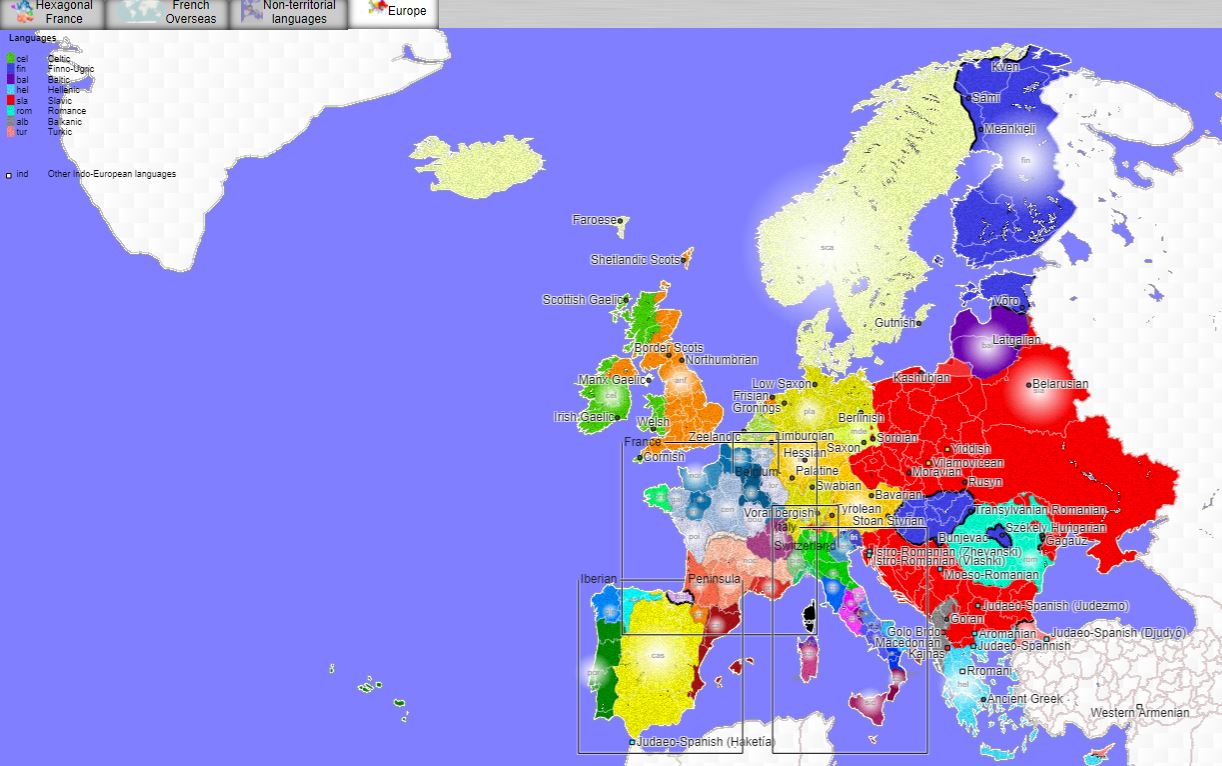 |
|
Courriel européen des langues: à paraître bientôt
L’édition n° 45 de juin 2021 portera sur les répercussions de la Covid-19 sur l’éducation aux langues.
Atlas sonore des langues régionales
L’atlas contient 791 enregistrements de langues et leurs transcriptions de la fable d’Ésope « Le vent du Nord et le soleil ». Il a été réalisé par trois chercheurs du Centre national de la recherche scientifique et de l’Université de Paris-Saclay.
Semaine des langues (17-21 mai 2021)
Cet événement annuel offre une ouverture linguistique et culturelle aux élèves, encourage la pratique de langues vivantes, fédère et permet de mettre en avant des projets. « Osons les langues, pour les citoyens de demain » : c’était le thème retenu pour cette édition 2021.
LISEO: bulletins d’information et publication de France Éducation International
LISEO est le portail documentaire de France Éducation international (le point de contact national du CELV en France), spécialisé dans l’éducation, l’enseignement et la diffusion du français dans le monde.
Publication récente : Revue internationale d’éducation de Sèvres, Dossier : l’oral dans l’éducation, n° 86, mai 2021, coordination: Daniel Coste, Roger-François Gauthier. | Edit |
|
Islande : ressources, conférences |
 |
|
Vigdís lance Lexía, un nouveau dictionnaire islandais-français en ligne
Lexía a été développé par deux institutions universitaires de Reykjavík : l’Árni Magnússon Institute for Icelandic Studies (AMI) et le Vigdís Finnbogadóttir Institute of Foreign Languages (VFI). Lexía s’inspire d’un autre dictionnaire en ligne basé à l’AMI : ISLEX, un dictionnaire multilingue entre l’islandais et six langues cibles scandinaves. Avec 50 000 lemmes, le vocabulaire de Lexía est principalement de l’islandais contemporain, mais de nombreux mots des stades plus anciens de la langue sont également inclus.
Les groupes cibles sont les Islandais qui ont besoin de trouver des mots en français, les traducteurs, les apprenants et les enseignants d’islandais dans les pays francophones, ainsi que les apprenants et les enseignants de français en Islande.
Annonce de conférences
Nordic Intercultural Communication Conference: « Changing regional identities and intercultural communication » (Reykjavík, 25-27 novembre 2021)
Plus d’informations
15th Conference on Nordic languages as a second language, NORDAND 15 (Reykjavík, 25-27 mai 2022)
La conférence porte sur les langues nordiques en tant que deuxième langue ou langue étrangère ainsi que sur le plurilinguisme dans les pays nordiques.
Plus d’informations | Edit |
|
Forum pour le réseau professionnel du CELV
|
Edit
|
Prochains événements des membres du Forum |
|
Le Forum pour le réseau professionnel du CELV est constitué d’associations et d’institutions internationales partageant des valeurs communes et ayant une expertise similaire dans le domaine de l’enseignement / apprentissage des langues et de l’évaluation. Sous les auspices du CELV, les membres s’engagent à partager leur savoir-faire et à travailler ensemble dans des domaines d’intérêt commun, en vue d’améliorer l’éducation aux langues.
Les partenaires actuels sont : ACTFL, AILA, ALTE, CEL/ELC, CercleS, EALTA, EAQUALS, ECSPM, CELV/Conseil de l’Europe, EDiLiC, EFNIL, EPA, EUNIC, FIPLV, IAM, ICC, ILOB.
| Edit |
|
Eaquals |
|
Eaquals fête ses 30 ans
Conférence du 30e anniversaire d’Eaquals (21 octobre 2021, Belfast, Royaume-Uni)
La conférence est ouverte à tous, membres et non membres, et propose un riche programme de développement professionnel pour les gestionnaires de centres, les directeurs, les responsables académiques, les formateurs d’enseignants ainsi que les chercheurs et les enseignants.
Plus d’informations
Souvenirs d’Eaquals
Eaquals a invité ses membres à contribuer à une courte vidéo partageant un de leurs souvenirs personnels du temps passé avec Eaquals, intitulée « My Eaquals Memory » (« Mon souvenir d’Eaquals »).
Webinaires Eaquals
Á travers sa série de webinaires, Eaquals offre une formation mensuelle en ligne sur une variété de sujets dans le secteur de l’enseignement des langues, qui peut intéresser les enseignants de langues, les formateurs d’enseignants, les responsables universitaires et les chercheurs. Consultez le calendrier pour connaître les prochains webinaires.
| Edit |
|
Le multilinguisme dans l’enseignement supérieur en Europe : symposium en ligne de l’ECSP (28-29 juin 2021) |
|
L’événement est organisé par le Département de linguistique et le Centre pour le multilinguisme de l’Université de Constance, en Allemagne, ainsi que par l’Alliance européenne pour la réforme universitaire (ERUA), qui est financée par l’UE. Les membres du groupe CURUM de l’ECSPM discuteront de la question du monolinguisme et du rôle de l’anglais dans l’enseignement supérieur, en lien avec l’internationalisation des universités. Les orateurs invités, ayant une expérience de la recherche et de l’enseignement en Europe et sur d’autres continents, présenteront leurs points de vue et les résultats de leurs recherches concernant l’éthos monolingue et la colonisation des connaissances curriculaires dans l’enseignement supérieur, puis leurs propositions constructives.
| Edit |
|
Développements au Conseil de l’Europe
|
Edit
|
Charte européenne des langues régionales ou minoritaires |
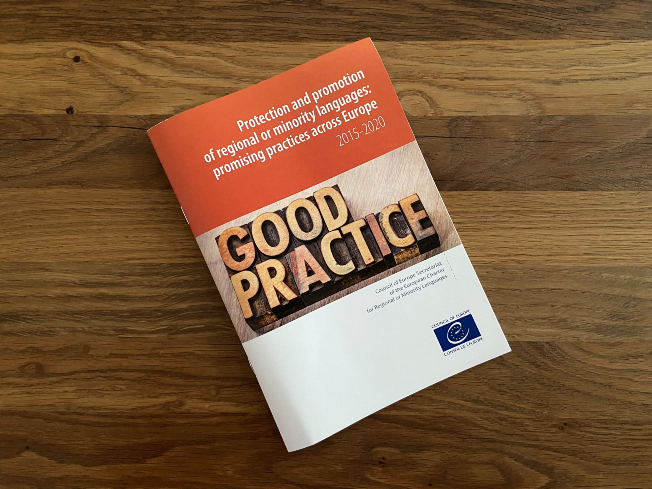 |
|
La Charte européenne des langues régionales ou minoritaires est la Convention européenne pour la protection et la promotion des langues employées par des minorités traditionnelles. Elle constitue, avec la Convention‑cadre pour la protection des minorités nationales, l’engagement du Conseil de l’Europe en faveur de la protection des minorités nationales.
L’application de la Charte européenne des langues régionales ou minoritaires (2018-2020) : 10e rapport de la Secrétaire Générale du Conseil de l’Europe
Le rapport met en exergue les améliorations qui ont été apportées au mécanisme de suivi de la Charte par le Comité des Ministres en 2018 et leur mise en pratique depuis lors par les parties prenantes concernées. En outre, il expose les réponses apportées aux défis à l’égalité des droits des locuteurs des langues traditionnellement parlées en Europe dans le contexte de la crise de santé publique. Et il retrace les actions du Conseil de l’Europe en vue de contribuer au développement de politiques et pratiques antidiscriminatoires conformes aux standards de l’Organisation.
Vient de paraître :
Pratiques prometteuses pour la protection et la promotion des langues minoritaires – transfert de connaissances à travers l'Europe
| Edit |
|
Cadre de référence des compétences pour une culture de la démocratie : deux nouveaux portfolios |
|
Edit |
|
Ressources récentes du Conseil de l’Europe |
|
Edit |
|
Actualités d’autres organisations
|
Edit
|
Cérémonie de remise du prix Juvenes Translatores le 18 juin 2021 |
|
Les 27 lauréats de Juvenes Translatores, le concours annuel de traduction pour les écoles organisé par la Commission européenne, ont été célébrés le 18 juin.
| Edit |
|
Projet Erasmus+ « Global citizenship and multilingual competences » (GCMC) (2020-2023) |
|
Le projet Erasmus+ « Global citizenship and multilingual competences » (GCMC) (Citoyenneté mondiale et compétences multilingues) vise à fournir des ressources de développement en ligne pour les enseignants du secondaire de toutes les matières. Celles-ci montreront comment intégrer, de manière durable, les objectifs de citoyenneté mondiale et les pédagogies plurilingues dans les pratiques pédagogiques. Le partenariat stratégique du projet est composé de l’Université de Graz (Autriche), l’Université de Newcastle (Royaume-Uni), la Fryske Akademy (Pays-Bas), l’Université de Bologne (Italie) et NEOSMART Digital (Allemagne). | Edit |
|
V-PAL : vidéos récentes |
|
La plateforme de la communauté V-PAL a été développée par six partenaires du Danemark, d’Allemagne, d’Espagne, de Roumanie et de Chypre, et est cofinancée par le programme Erasmus+. L’objectif de V-PAL est d’accroître la qualité de l’enseignement linguistique des adultes en améliorant les possibilités de formation continue et de développement professionnel des enseignants. La plateforme est une source d’inspiration pour l’enseignement des langues ; elle encourage l’échange de pratiques par vidéo et permet de réfléchir à la fois sur ses propres pratiques et celles de collègues.
- Dernières vidéos (inscription gratuite) : Using Padlet for an online reading circle ; Mobil-bingo ; Online collaboration with padlet ; QR codes ; Picture dictation ; Disappearing lines : online ; Online: What’s hiding? ; Subjects for new videos?
- Suivre V-PAL sur Facebook
| Edit |
|
School Education Gateway |
|
Edit |
|
OCDE : publications récentes |
|
Edit |
|
Mercator – Centre de recherche européen sur le multilinguisme et l’apprentissage des langues |
|
Edit |
|
Cambridge University Press: revitalisation des langues en danger |
|
Edit |